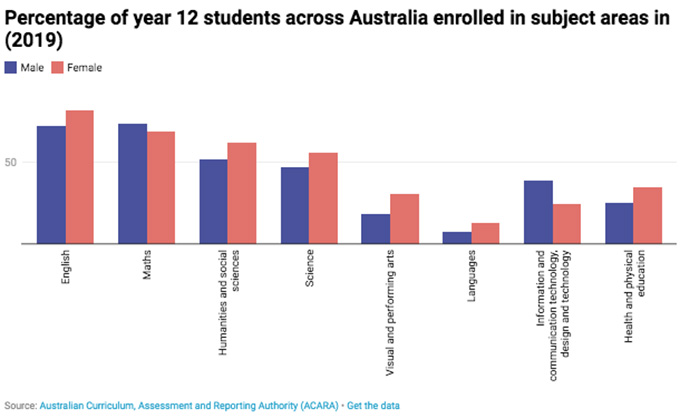 Some students elect to study languages in their senior years because of personal interest, or because they have previously been successful in language learning. Others may choose to do so because of future career plans, or because they wish to further their studies at university.
Other important influences on students’ decisions are perceived cognitive benefits. Studying languages can lead to more effective thinking skills and enhanced intercultural understanding.
Research shows high achieving students in capital cities are most likely to study a language in years 11 and 12. This is particularly the case for students whose parents were born overseas in non-English speaking countries.
Girls are more likely to do languages than boys — research suggests they are just more motivated to do so.
If you’re thinking of studying a language in years 11 and 12, here’s what you should know.
Some students elect to study languages in their senior years because of personal interest, or because they have previously been successful in language learning. Others may choose to do so because of future career plans, or because they wish to further their studies at university.
Other important influences on students’ decisions are perceived cognitive benefits. Studying languages can lead to more effective thinking skills and enhanced intercultural understanding.
Research shows high achieving students in capital cities are most likely to study a language in years 11 and 12. This is particularly the case for students whose parents were born overseas in non-English speaking countries.
Girls are more likely to do languages than boys — research suggests they are just more motivated to do so.
If you’re thinking of studying a language in years 11 and 12, here’s what you should know.
Few students choose to study a language
In Australia, 10% of year 12 students studied a language in 2019. This compared with enrolments of 77% and 71% for the most popular learning areas, English and maths. The visual and performing arts were the second-least popular at 25%. In other parts of the world, however, language learning is on the up. So if you’re looking to broaden your horizons, learning a language is a good way to go. We don’t know the exact reasons for the low enrolments. One reason could be that the language a student wants to learn isn’t always available. For example, the majority of students who study Indonesian at the primary level don’t continue when they enter secondary school, often because it’s no longer available.
Among students who do decide to study a language in years 11 and 12, the most popular choices are Chinese (22%), Japanese (20%) and French (18%).
Chinese is the second most widely-spoken language in Australian homes after English, which may be one reason for its popularity. But there are many factors that influence the popularity of a language, such as students of French being interested in French culture.
We don’t know the exact reasons for the low enrolments. One reason could be that the language a student wants to learn isn’t always available. For example, the majority of students who study Indonesian at the primary level don’t continue when they enter secondary school, often because it’s no longer available.
Among students who do decide to study a language in years 11 and 12, the most popular choices are Chinese (22%), Japanese (20%) and French (18%).
Chinese is the second most widely-spoken language in Australian homes after English, which may be one reason for its popularity. But there are many factors that influence the popularity of a language, such as students of French being interested in French culture.
What can you do with languages?
If you’re planning on going to university, learning a language will give you a leg up in the applications. Some Australian universities actually offer bonus ATAR points to students studying a language. For instance, ANU will bump your score up by five points if you take a language. There are many career pathways available to language graduates. Teaching, interpretation, translation and diplomacy are some of them. A quick search on Seek throws up more than 4,000 jobs requiring language expertise including for lawyers, technical support engineers, sales representatives and market data analysts. Other options include finance, media, public relations, tourism, consulting, marketing, charity work, international business, foreign affairs or government work. Kevin Rudd’s knowledge of Mandarin gave him an edge as foreign affairs minister. Many industries will welcome language graduates because they bring intercultural skills, which are crucial in our globally connected world. Plus, a second language can allow you to travel the world while developing your career.What will you learn in the senior years?
What you will learn depends on which school you go to, what state you live in and which language you choose. In most senior courses, you’ll not only learn the language but also its associated culture. For instance, in Victoria the senior language curriculum is organised into three broad themes:- the individual, which looks at cultural topics such as relationships, educational aspirations, and leisure and sports
- the (language)-speaking communities, where you explore aspects of the history and the culture, arts and entertainment, lifestyles and ways of life
- the changing world, where you engage with social issues, youth issues, environmental concerns and work.
Is it better to take a language you’ve already been learning?
If you take the same language in the senior years as you have all through school, you will obviously benefit from already knowing a lot of the language as well as its grammatical structure. But you could also take the opportunity to learn a different language, which will be easier to grasp now that you’ve already studied one. Language learning involves developing knowledge about how language works. For instance, if you learn French throughout high school, you will develop a detailed and technical knowledge of the grammar of both English and French. You could transfer your knowledge of how the French grammatical system works to another language.What do the exams look like?
The structure of senior language exams differs slightly depending on the state you are in. But generally the exam will require students to read and respond to both written and oral texts. The written exam may include reading a passage in the language and answering questions to demonstrate comprehension of the text’s ideas or arguments. There will also be questions that involve composing texts in the language, such as an email, a description of an event such as a holiday or a letter to a friend. The oral texts are often pre-recorded and played to students several times. After listening to the oral texts, students are often asked to answer questions (in English or the target language). The oral exam may also include a conversation with the examiners and/or a discussion with the examiners on a prepared topic.Author Bios: Mairin Hennebry-Leung is a Lecturer in Languages and TESOL, Andy Bown is a Lecturer in Languages and Megan Short is Program Director, Postgraduate Coursework Lecturer, Language & Literacy all at the University of TasmaniaHey teachers and parents and students, check out The Conversation’s TikTok video based on our article to help year 10s choose year 11&12 subjects. And pass it on to those who need the advice https://t.co/tWiBWpkiks
— Sasha Petrova (@SasshaPetrova) July 20, 2021